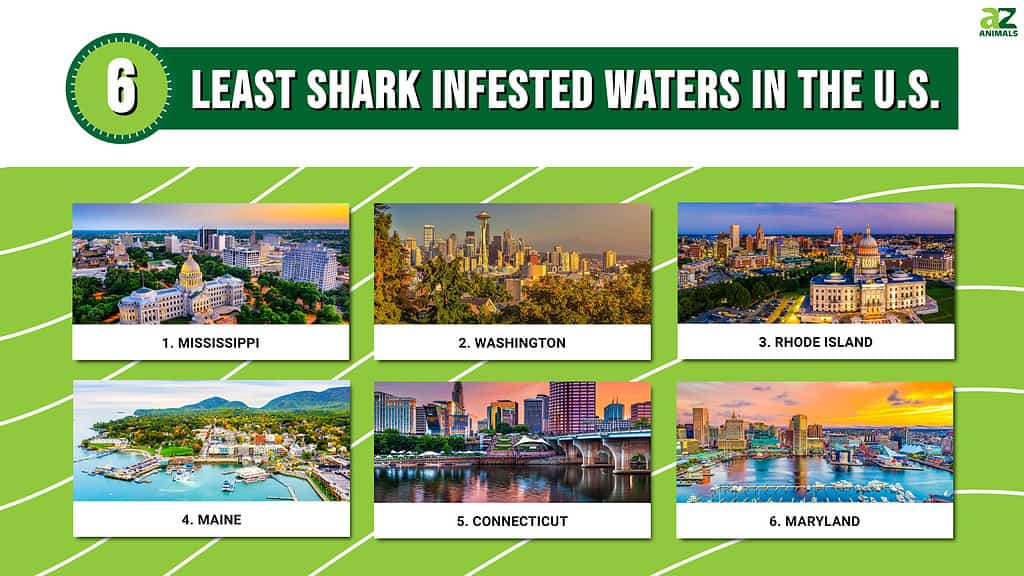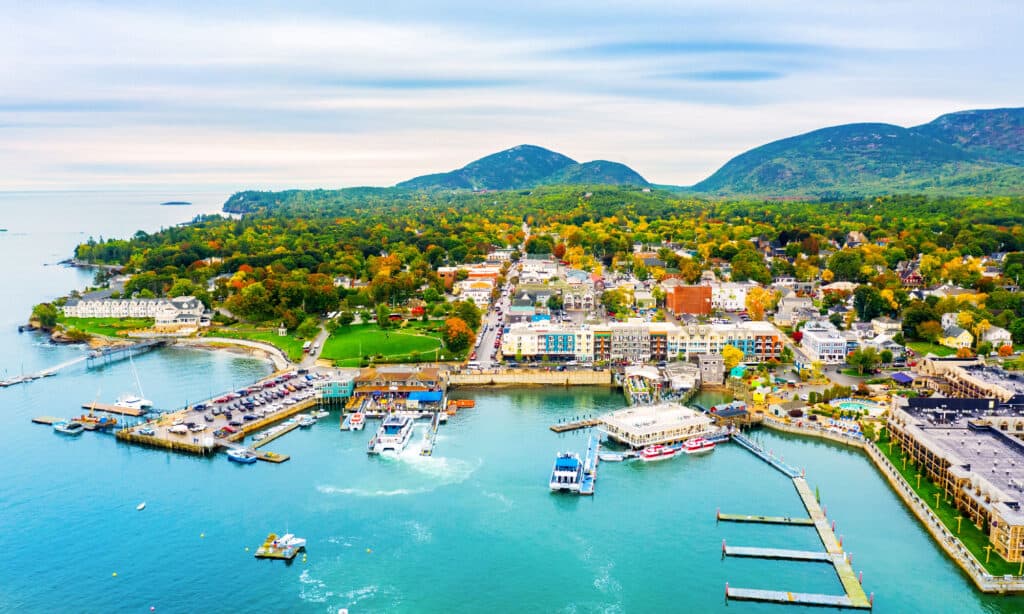The United States is one of the world’s largest and most populated countries, with a surface area of about 3,796,743 square miles. According to World Atlas, America has 14 states with shorelines along the Atlantic Ocean and five states along the Pacific Ocean.
These large coastlines make the United States one of the most frequented vacation destinations worldwide and the country with the highest number of shark attacks. Although some of America’s waters frequently record shark attacks, others are quite the opposite. Let’s discover the least shark-infested waters in the United States.

How Many Shark Attacks Have Occurred in the United States?
According to the International Shark Attack File (ISAF), the United States has had over 1,500 recorded shark attacks between 1837 and 2021. Shark attacks have been recorded in 21 states in America over the past two centuries. The frequency of these attacks varies, from as high as 800 plus in Florida to as little as 1 in Connecticut. Compared to the country’s population of over 300 million people, the odds of getting attacked by a shark in the United States waters are quite low.
The 6 Least Shark Infested Waters in the United States
In America, only six of the 21 shark states have had fewer than three shark attacks, indicating that these states have some of the least shark-infested waters in the United States. Let’s take a look at these six states.
1. Mississippi

There have been only two shark attacks in Mississippi.
©Sean Pavone/Shutterstock.com
In the past 200 years, the state of Mississippi has only recorded two shark attacks. The southeastern state is bordered in the south by the Gulf of Mexico, a marginal sea of the Atlantic Ocean. The coastlines’ size is a major factor influencing the low rate of shark attacks in the state. Mississippi’s beaches span about 26 miles (41.84 kilometers)— much smaller compared to the state of Florida.
In addition, due to the Gulf of Mexico’s brackish nature, not many sharks make it up to the shores of Mississippi. According to the Marine and Fishery Sciences, the popular Mississippi River, which runs through the state, has only recorded two bull shark sightings in Illinois and Missouri throughout the 20th century.
2. Washington

Washington has had only two shark attacks since 1837; both were nonfatal.
©canadastock/Shutterstock.com
Washington is a northwestern state in America, with its western part bounded by the Pacific Ocean. This access to the ocean fills the state coastlines with diverse flora and fauna, including sharks. However, there have only been two recorded shark attacks in the state of Washington and both were luckily non-fatal. Both attacks occurred in Gray’s Harbor, on the west coast.
According to reports, Washington has about 30 shark species along its coastlines but despite this abundance of sharks, there are rarely ever any shark attacks. This peaceful coexistence between sharks and humans is partly due to the low presence of the highly aggressive great white shark species and other big sharks in Washington. The common sharks, such as salmon sharks and dogfish sharks, are non-threatening sharks.
3. Rhode Island

There have been two recorded shark attacks in the past two centuries in Rhode Island.
©iStock.com/Ultima_Gaina
Rhode Island is the smallest state in America by area, and it is bordered by Connecticut, Massachusetts, and the Atlantic Ocean. As stated by the University of Rhode Island, about 50 different shark species pass through the East Coast annually. However, only a few get to Rhode Island, especially the larger and more aggressive sharks. Since 1837, there have only been two recorded shark attacks in Rhode Island waters.
According to James Town Press, the large and more dangerous sharks, such as the great whites, migrate towards Rhode Island in the fall and winter when fewer people are out on the beaches. The behavior of these large predators results from the migration of seals and other shark prey towards the state. Common sharks in Rhode Island waters are blue sharks, smooth dogfish sharks, and sand tiger sharks, which pass during spring.
4. Maine

There have been two shark attacks in Maine.
©Mihai_Andritoiu/Shutterstock.com
Maine is one of the smallest states in America, bordered by New Hampshire, Canada, and the Gulf of Maine in the northeastern part of the United States. The gulf has access to the infamous Cape Cod, known for its abundance of sharks. However, Maine has only had two recorded shark attacks in the past two centuries. This low attack count is astonishing as the state has one of the largest coastlines in the New England territory.
The abundance of prey in Cape Cod is one of the reasons sharks have not infested Maine’s waters. The Gulf of Maine also gets its share of sharks, but these deep-water predators hardly get too close to Maine’s shorelines. Common shark species in Maine’s waters are the blue shark and the porbeagle.
5. Connecticut

There has only been one recorded shark attack in Connecticut.
©Sean Pavone/Shutterstock.com
Connecticut has only had a single shark attack in its waters, making the state’s beaches some of the safest in America. The small state is bordered by Rhode Island, Massachusetts, New York, and the Long Island Sound. The Long Island Sound connects Connecticut’s coastlines to the Atlantic Ocean.
As reported by NBC News, about four shark species are regular in Connecticut waters, all of which feed on invertebrates and schools of fish, not seals. The brown shark, sand tiger shark, and two species of the dogfish shark can be found in the Long Island Sound. These shark species do not pose threats to humans in this region.
6. Maryland

There have been two nonfatal shark attacks in Maryland waters.
©iStock.com/Kruck20
Maryland is bordered by five states and the Atlantic Ocean, which is east of the state. Despite having an eastern shoreline, there have only been two recorded shark attacks in the state. Based on account of the Maryland Department of Natural Resources, there have been no shark attack fatalities in the state’s waters despite the many sightings.
The state is home to the largest estuary in the United States, the Chesapeake Bay. The bay’s salinity makes it less suitable for most shark species who would rather not swim further up the bay. Sandbar sharks are among the common shark species in the bay and are known to lay eggs there. It is believed that the warmer the bay gets, the more sharks would be found closer to shore.
Summary of 6 Least Shark Infested Waters in the United States
Here’s a recap of the six states in the U.S. that have the least dangerous shark-infested waters.
| Number | State | No. of Shark Attacks | Reason for Low Level of Shark Attacks |
|---|---|---|---|
| 1 | Mississippi | 2 in the past 200 years | Small coastline, spans about 26 miles |
| 2 | Washington | 2 since 1837 | Low presence of great white sharks and other aggressive sharks |
| 3 | Rhode Island | 2 since 1837 | Large sharks such as great whites migrate in fall and winter when fewer people are on the beaches |
| 4 | Maine | 2 in the past 200 years | Abundance of prey in Cape Cod; sharks also in deep-water areas such as Gulf of Maine |
| 5 | Connecticut | 1 | Shark species feed on invertebrates and fish, not seals |
| 6 | Maryland | 2 | Chesapeake Bay’s salinity makes it less suitable for most shark species |
The photo featured at the top of this post is © iStock.com/Sean Craft
Sources
- Florida Museum, Available here: https://www.floridamuseum.ufl.edu/shark-attacks/maps/na/usa/usa-all/
- The University of Rhode Island, Available here: https://web.uri.edu/quadangles/030-state-of-sharks/
- Marine and Fishery Sciences, Available here: https://ojs.inidep.edu.ar/index.php/mafis/article/view/181
Thank you for reading! Have some feedback for us? Contact the AZ Animals editorial team.






